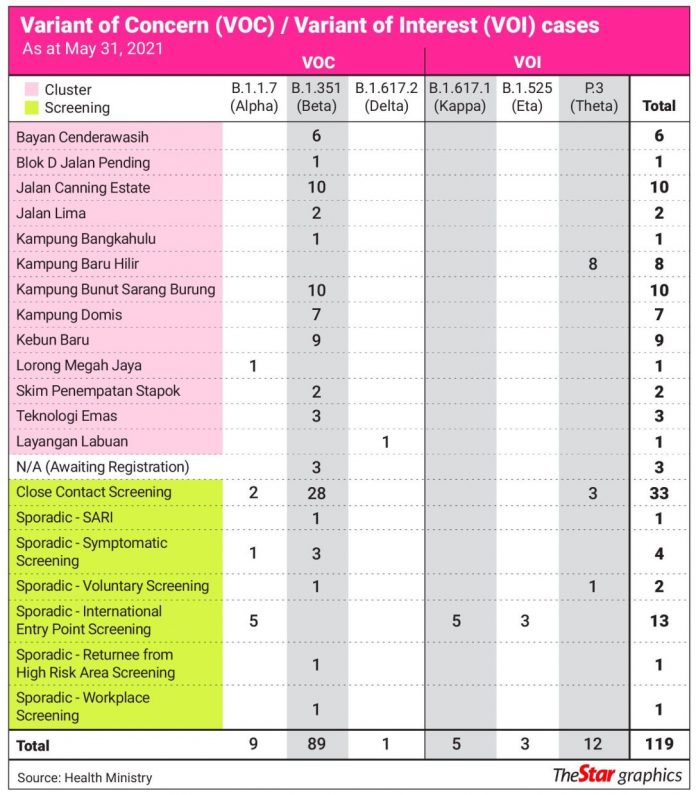PETALING JAYA: With over a hundred Covid-19 cases so far listed under either the Variants of Concern (VOC) or Variants of Interest (VOI) categories, the Health Ministry is ramping up genomic surveillance to map out the spread of these strains which have a high infectivity rate.
Health director-general Tan Sri Dr Noor Hisham Abdullah said the ministry was collaborating with universities, the Science, Technology and Innovation Ministry and private labs to increase the capacity of genomic testing.
He said yesterday that Universiti Malaysia Sarawak (Unimas) and University Malaya Medical Centre (UMMC) were among those that would be involved in helping the government in the initiative.
“We have shared what we do know from the sampling so far, especially the clusters, ” he said, pointing out that Malaysia had detected a total of 119 Covid-19 cases in either the VOC or VOI categories as of May 31.
On Tuesday, Dr Noor Hisham said the VOC identified locally were mainly the Beta or B.1.351, which was first detected in South Africa in May 2020, and also the Alpha or B.1.1.7, initially identified in the United Kingdom in September 2020.
He had said that the VOC had been found in every state in Malaysia, and there was likely to be more of these different strains being spread in the community nationwide.
Universiti Malaya virology expert Prof Dr Sazaly Abu Bakar said it was a good move to have universities conduct genomic surveillance and epidemiological analysis to track these new variants since they had the facilities.
Prof Sazaly, who is also director for Universiti Malaya’s Tropical Infectious Diseases Research and Education Centre, said the centre, which has the technology and expertise for rapid genome sequencing, would be involved in helping the ministry with the testing.
Malaysia must improve on virus-sequencing capacity in order to prohibit these variants from being spread undetected, said Prof Sazaly, who suggested back in April 2020 that universities be called to contribute to genome sequencing.
“All four VOC out there – Alpha, Beta, Gamma and Delta – are equally concerning as there is not much scientifically known about their behaviour and biological properties.
“If the virus can establish persistent and latent infection, meaning it will persist in an infected person asymptomatically for a longer time, ” he replied when asked about the feature of most concern of the VOC.
Prof Sazaly said although there was insufficient data to suggest that the VOC could evade the body’s immune response after one had been vaccinated, it was best to accelerate the vaccination drive.
“The key is to deliver the vaccination rapidly in the shortest possible time to minimise continued virus evolution, ” he added.
Universiti Putra Malaysia medical epidemiologist and biostatistician Assoc Prof Dr Malina Osman said scientists were very concerned if these VOC or VOI might be correlated with much higher transmissibility rate or much severe clinical features, increasing the number of cases in the intensive care units and deaths.
She said continuous monitoring and identification in the laboratory as well as all relevant clinical manifestations would tell whether new versions of vaccines tailored to the new variants would be needed or not.
“Similar to medicines, at one point, we can determine whether it has reached the resistance level.
“As for now, we have to focus on the vaccination programme as indicated.
“Current evidence involving the strain from South Africa or Beta has shown that it can affect the immune response but current vaccines are still able to protect the person from severe complications, ” Dr Malina said.
On whether Malaysia needs to improve on genomic surveillance, she said that in any outbreak, data sharing and research opportunities should be teamwork with all relevant stakeholders to provide useful information to the country.
“Focus on research during an outbreak is to end it as soon as possible and to disseminate the information to others who serve important roles in this pandemic management.
“The role of academicians, scientists and those in the field should be coordinated together for the sake of the country, not for the sake of publications only, ” Dr Malina added.
























